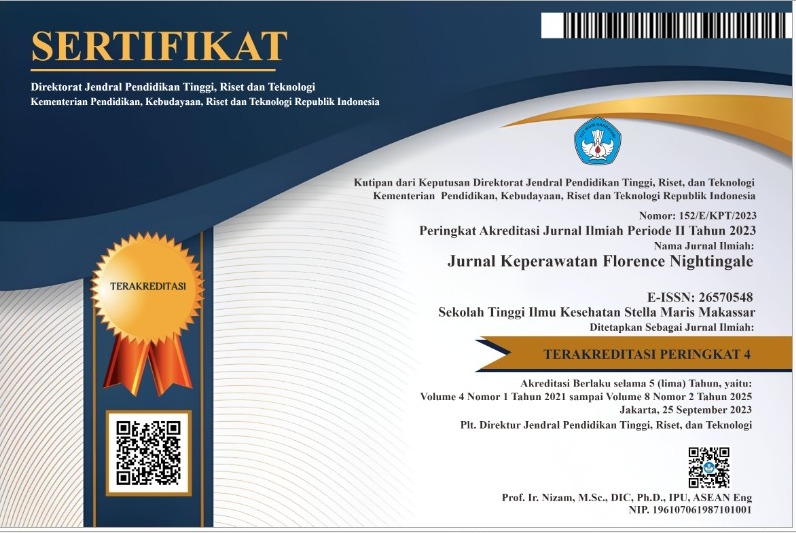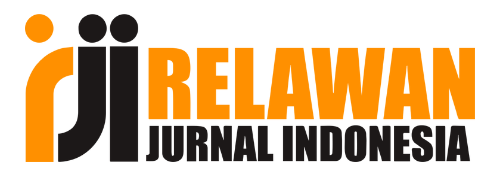Utilization of the KePO Application as an Early Detection Strategy for Breast Cancer
Keywords:
Utilization, KePO Application, Early Detection, Breast Cancer, StrategyAbstract
Breast cancer is the second highest cause of death in the world. However, cancer can be prevented with a healthy lifestyle, even breast cancer that is detected early and treated immediately increases the patient's life expectancy. The Online Breast Cancer Application (KePO) contains information on calculating breast cancer risk scores, material on avoiding breast cancer risk factors and how to do breast self-examination. This study used a descriptive design which aimed to measure the use of the Kepo application as an early detection strategy for breast cancer with a sample size of 26 people. Based on the research results, respondents stated that KePO is beneficial for society. 34.6% of respondents strongly agreed that by using the KePO application I could quickly understand breast self-examination techniques, 38.5% of respondents strongly agreed that by using the KePO application I did not need to pay for transportation to go to a health facility, 38.5% of respondents stated that they strongly agree that by using the KePO application I do not feel embarrassed about doing my own breast examination, 42.3% of respondents stated that they strongly agree that using the KePO application helps save time queuing at health facilities and 34.6% of respondents stated that they strongly agree that the KePO Application very useful. The KePO application has a positive impact and is easy to use by women of childbearing age, so it tends to be a leverage to reduce breast cancer rates in the future.
Downloads
References
Barrios, Carlos H. 2022. “Global Challenges in Breast Cancer Detection and Treatment.” Breast 62(March):S3–6. doi: 10.1016/j.breast.2022.02.003.
Chávarri-Guerra, Yanin, Cynthia Villarreal-Garza, Pedro E. R. Liedke, Felicia Knaul, Alejandro Mohar, Dianne M. Finkelstein, and Paul E. Goss. 2012. “Breast Cancer in Mexico: A Growing Challenge to Health and the Health System.” The Lancet Oncology 13(8). doi: 10.1016/S1470-2045(12)70246-2.
Das, Akhil Kumar, Saroj Kr Biswas, Ardhendu Mandal, Arijit Bhattacharya, and Saptarsi Sanyal. 2024. “Machine Learning Based Intelligent System for Breast Cancer Prediction (MLISBCP).” Expert Systems with Applications 242(May). doi: 10.1016/j.eswa.2023.122673.
DKK Medan, Dinas. 2021. Data Capaian SADANIS Kota Medan.
Fathoni, M. Ivan Ariful, Gunardi, Fajar Adi-Kusumo, and Susanna Hilda Hutajulu. 2021. “Survival Analysis of Breast Cancer Patients in Yogyakarta.” Journal of Physics: Conference Series 1722(1):0–14. doi: 10.1088/1742-6596/1722/1/012060.
Globocan. 2020. “Cancer Incident in Indonesia.” International Agency for Research on Cancer 858:1–2.
Gyawali, Bishal, Meghan Bowman, Isobel Sharpe, Matthew Jalink, Siddhartha Srivastava, and Don Thiwanka Wijeratne. 2023. “A Systematic Review of EHealth Technologies for Breast Cancer Supportive Care.” Cancer Treatment Reviews 114(March). doi: 10.1016/j.ctrv.2023.102519.
Hassan, Ebtesam Esmail, Amany Edward Seedhom, and Eman Mohamed Mahfouz. 2017. “Awareness about Breast Cancer and Its Screening among Rural Egyptian Women, Minia District: A Population-Based Study.” Asian Pacific Journal of Cancer Prevention 18(6):1623–28. doi: 10.22034/APJCP.2017.18.6.1623.
Hutajulu, Susanna Hilda, Yayi Suryo Prabandari, Bagas Suryo Bintoro, Juan Adrian Wiranata, Mentari Widiastuti, Norma Dewi Suryani, Rorenz Geraldi Saptari, Kartika Widayati Taroeno-Hariadi, Johan Kurnianda, Ibnu Purwanto, Mardiah Suci Hardianti, and Matthew John Allsop. 2022. “Delays in the Presentation and Diagnosis of Women with Breast Cancer in Yogyakarta, Indonesia: A Retrospective Observational Study.” PLoS ONE 17(1 January):1–19. doi: 10.1371/journal.pone.0262468.
Kemenkes RI. 2019. “Beban Kanker Di Indonesia.”
Kemenkes RI. 2022. Profil Kesehatan Indonesia 2021.
KPKN. 2015. Panduan Nasional Penanganan Kanker Payudara.
Novitarum, Lilis, M. Fidel Ganis Siregar, Fazidah Aguslina Siregar, and Namora Lumongga Lubis. 2023. Bebas Kanker Payudara: Kenali Dan Hindari Sejak Dini. Sleman.
Novitarum, Lilis, Muhammad Fidel Ganis Siregar, Fazidah Aguslina Siregar, and Namora Lumongga Lubis. 2022. “Survivor’s Experience in Fighting Breast Cancer.” Journal of Population Therapeutics and Clinical Pharmacology 29(4):126–33. doi: 10.47750/jptcp.2022.976.
Peraboi. 2014. Panduan Penatalaksanaan Kanker Payudara.
Riskesdas. 2018. “Hasil Utama Riskesdas 2018 Kementrian Kesehatan Republik Indonesia.” Kemenkes RI 1–100.
Wadasadawala, Tabassum, Sanjay K. Mohanty, Soumendu Sen, Tejaswi S. Kanala, Suraj Maiti, Namita Puchali, Sudeep Gupta, Rajiv Sarin, and Vani Parmar. 2024. “Out-of-Pocket Payment and Financial Risk Protection for Breast Cancer Treatment: A Prospective Study from India.” The Lancet Regional Health - Southeast Asia (June 2019). doi: 10.1016/j.lansea.2023.100346.
WHO. 2019. “Kasus Kanker Payudara Paling Banyak Terjadi Di Indonesia.” Databoks.
Published
How to Cite
Issue
Section
Copyright (c) 2025 Lilis Novitarum, Arjuna Ginting, Aprilita Br. Sitepu

This work is licensed under a Creative Commons Attribution-ShareAlike 4.0 International License.









